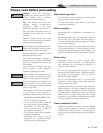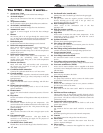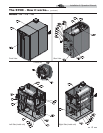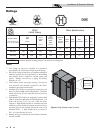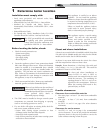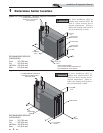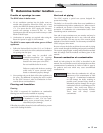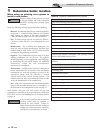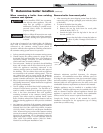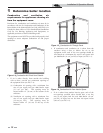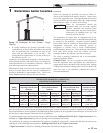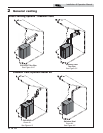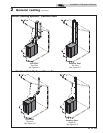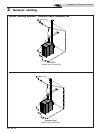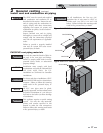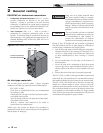
Installation & Operation Manual
1 Determine boiler location (continued)
11
When removing a boiler from existing
common vent system:
Do not install the SYNC into a common
vent with any other appliance. This will
cause flue gas spillage or appliance
malfunction, resulting in possible severe
personal injury, death, or substantial
property damage.
Failure to follow all instructions can result
in flue gas spillage and carbon monoxide
emissions, causing severe personal injury
or death.
a. Seal any unused openings in the common venting system.
b. Visually inspect the venting system for proper size and
horizontal pitch and determine there is no blockage or
restriction, leakage, corrosion, or other deficiencies,
which could cause an unsafe condition.
c. Test vent system – Insofar as is practical, close all building
doors and windows and all doors between the space in
which the appliances remaining connected to the
common venting system are located and other spaces of
the building. Turn on clothes dryers and any appliance
not connected to the common venting system. Turn on
any exhaust fans, such as range hoods and bathroom
exhausts, so they will operate at maximum speed. Do not
operate a summer exhaust fan. Close fireplace dampers.
d. Place in operation the appliance being inspected. Follow
the lighting instructions. Adjust thermostat so appliance
will operate continuously.
e. Test for spillage at the draft hood relief opening after 5
minutes of main burner operation. Use the flame of a
match or candle, or smoke from a cigarette, cigar, or pipe.
f. After it has been determined that each appliance
remaining connected to the common venting system
properly vents when tested as outlined herein, return
doors, windows, exhaust fans, fireplace dampers, and any
other gas-burning appliance to their previous conditions
of use.
g. Any improper operation of the common venting system
should be corrected so the installation conforms with the
National Fuel Gas Code, ANSI Z223.1/NFPA 54 and/or
CAN/CSA B149.1, Natural Gas and Propane Installation
Code. When resizing any portion of the common venting
system, the common venting system should be resized to
approach the minimum size as determined using the
appropriate tables in Part 11 of the National Fuel Gas
Code, ANSI Z223.1/NFPA and/or CAN/CSA B149.1,
Natural Gas and Propane Installation Code.
ƽ DANGER
ƽ WARNING
Remove boiler from wood pallet
1. After removing the outer shipping carton from the boiler,
removethe parts package (packaged parts inside the jacket
of the boiler).
2. To remove the boiler from the pallet:
a. Remove the front door of the boiler.
b. Remove the two lag bolts from the wood pallet
inside the boiler (FIG. 1-3).
c. Detach the boiler from the lag bolts in the rear of
the unit, see FIG. 1-3.
Do not drop the boiler or bump the jacket on
the floor or pallet. Damage to the boiler can
result.
LAG BOLTS
(QTY. 3)
FRONT
LAG BOLTS
(QTY. 3)
REAR
Figure 1-3 Boiler Mounted on Shipping Pallet
NOTICE
At the time of removal of an existing boiler, the following
steps shall be followed with each appliance remaining
connected to the common venting system placed in
operation, while the other appliances remaining connected to
the common venting system are not in operation.
Maintain minimum specified clearances for adequate
operation. All installations must allow sufficient space for
servicing the vent connections, water pipe connections, piping
and other auxiliary equipment, as well as the appliance. The
clearance labels on each appliance note the same service and
combustible clearance requirements as shown in this manual.
Multiple appliances may be installed in a modular boiler
installation. Multiple appliances may be installed side by side
with no clearance between adjacent appliances because this
appliance is approved for zero clearance from combustible
surfaces and no service access is required from the sides.
Consult the Venting section of this manual for specific
installation instructions for the appropriate type of venting
system that you will be using.



